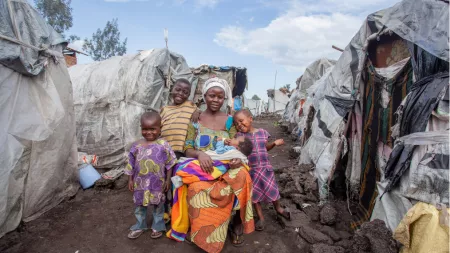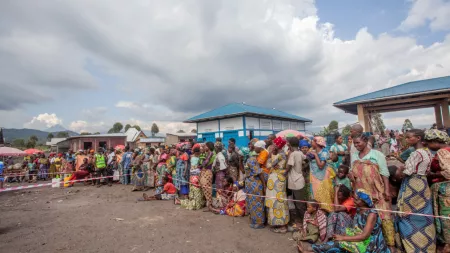Conflict and floods continue to displace more people in the Democratic Republic of Congo (DRC), worsening the humanitarian situation there for millions, especially women and girls. In fact, a recent analysis by CARE DRC found that 60% of the people displaced in the DRC are women.
As many flee their homes, some have died due to the lack of adequate rations in the camps as humanitarian organizations struggle to meet the rising influx of people against dwindling funding. With an estimated 6.2 million internally displaced persons (IDPs) DRC has the largest IDP population in Africa and one of the largest in the world. Due to family separations, many women now have the sole responsibility of caring for the home.
"With limited ways of earning a living being in the camps and being unable to access their farms women are children are going to bed hungry,"CARE International DRC Country Director Cisse Kadidia said.
CARE is concerned about the repercussions that hunger, fuelled by the increasing displacement, will have on women and girls. Kadidia said, “A CARE analysis found that the lack of food is forcing women to resort to dangerous activities. One of the negative adaptation methods’ that was identified was sex for survival. In a country where gender-based violence (GBV) cases increased by 37% in the first three months of 2023, and over 38,000 cases were reported in North Kivu alone in 2022, this is quite worrying.”
30-year-old Neema Zawadi happened to be caught up in the conflict forcing her to flee her home and now finds herself as the sole breadwinner of her four children after they were separated from her husband. “When the conflict broke out I was in the farm and my husband was in another farm. I could not grab anything except my children, and we fled on foot for three days. As my husband was on another farm, he fled in a different direction and ended up in another camp. When we fled, I was pregnant, and I gave birth here at the IDP camp. Life in the camp is hard unlike at home where I would go to the farm and my children would get something to eat. Here, I have to split firewood and sell it to make some money. When we don’t make money, we sleep hungry,” Neema said.

Before the recent conflict, DRC was already facing a major hunger crisis. Over 26 million people, a quarter of the population, lack reliable access to sufficient food. Of this, 50.6% are women, and 54.6 are children under the age of 18. As a result of years of conflict, health facilities have also been affected, and many people could not go to their farms due to high levels of insecurity. The conflict in Ukraine also played a big role in affecting many people as prices of basic commodities such as cooking oil, flour, fuel, and other essentials skyrocketed. Years of outbreaks of diseases such as Ebola, cholera, and the COVID-19 pandemic, played a major role in the deteriorating humanitarian situation in DRC.
CARE's response
CARE has been working alongside partners and the government to support communities in Mudja and Munigi where the displaced people have settled creating collective centers after fleeing from their homes. Individuals have received food rations – comprised of cooking oil, salt, maize flour, beans, and salt –, hygiene kits for women and girls as well as training on GBV prevention and Sanitation and hygiene to combat disease.
During a recent visit to an IDP camp in Mudja, Claudine Awute, CARE Vice President, International Programs and Operations said, “CARE has already carried out a series of distributions to ensure a decent food ration for the 12,000 people living here. These distributions are not enough to ensure the necessary rations for children and pregnant women. That’s why we’ve heard of cases of eight fatalities in the camp. I’d like to take this opportunity to appeal to humanitarian actors and the donors who support our actions to grant more aid to meet the immediate vital needs of the community.”
A lot more still needs to be done to support the vulnerable and suffering in DRC.
For media inquiries, please contact: David Mutua, CARE East, Central, & Southern Africa Regional Communications Advisor via: [email protected]
Notes to Editors:
- CARE has been active in DRC since 1994. Current areas of operations include North and South Kivu, Ituri, and Maniema.
- CARE has programming in the following sectors:
- sexual and reproductive health
- response to gender-based violence
- food security, livelihoods
- Water, Sanitation, and Hygiene
- Women’s Economic Empowerment
- Gender justice/women leadership
- Access to primary health care
- Community engagement/mobilization.
